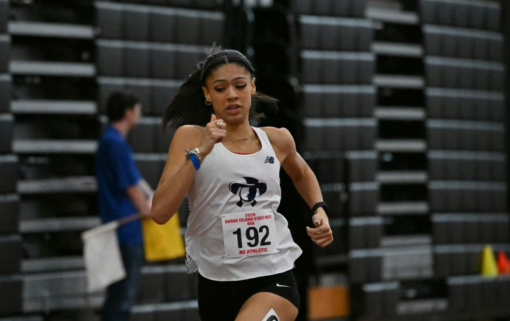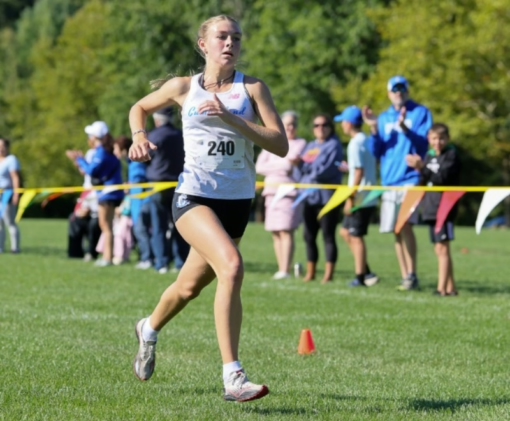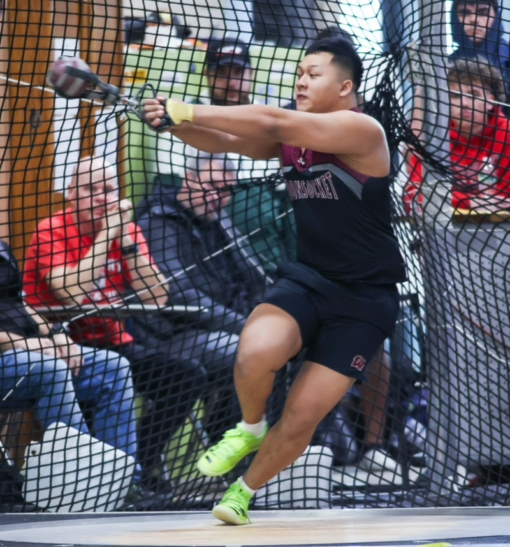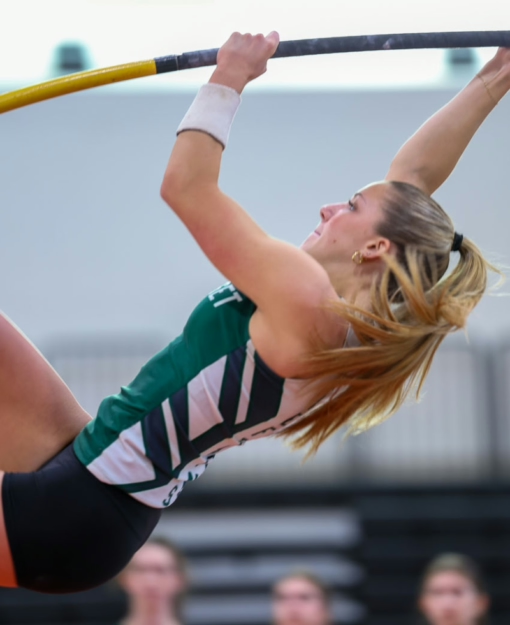
When you have a chance to pursue a goal, to reach a dream that in the grand scheme of things few have accomplished every four years, the window of opportunity is not too big. Sometimes that window can be cracked open just enough to let in a slight breeze, a breeze that could blow that dream away.
Oftentimes, sacrifices have to be made to ensure that the window does not get closed shut.
Six months ago, that’s the dilemma that Maddy Berkson felt she was facing during her rapidly-improving, post-collegiate running career. With enough money saved up in her banking account from five years as an engineer in several different capacities, the former Classical High standout made the bold move to put her working career on hold to chase a dream, an attainable one for the talented runner, a berth in the U.S. Olympic Team Trials.
Back in January, she left her job as a mechanical engineer at the Providence location of Ximedica (now a part of Veranex), to set her sights on qualifying for the Trials in Eugene, Ore.
“I figured I have to step up my game and I figured a way to do that was quit the job and focus on training,” the 28-year-old Berkson said last week. “It was a pretty stressful job. It was engineering consulting. It was just squeezing in training around the job, after work, before work. Running was definitely secondary. I figured if I wanted to have a chance to make the Trials, I couldn’t just squeeze it around work anymore.”
Berkson’s gamble paid off. On Thursday at the University of Oregon’s famed Hayward Field, one of our state’s best-ever middle distance starswill be among the 36 runners that have qualified for the 1,500-meter run. She’s No. 27 on the list with a PR of 4:08.50 from the USATF Los Angeles Grand Prix on May 17.
“That was a good race,” said Berkson, about the Grand Prix event. “It was won by Heather McLean in 4:02. There was like a ton of people, kind of like me, that had run the same time in the last few months. There were like 19 people in the race. It was packed. But the weather was perfect and the pace was really good. It got strung out really quick. I ended up just running very even splits I ran like 65-, 66-second laps Honestly, I was just hanging on for dear life at the back of the pack. I ended up coming in 11th, which I didn’t love. It doesn’t feel great to come in 11th in a race. I gave it everything I had and the time was good.
Since the beginning of the year, it’s been all uphill for the Classical alum. She has broken 4:11 for the 1,500m all four times she has run the race in the last few months, including 4:09.60 at the Oregon Relays at Hayward on April 20, a 4:10.65 at the Music City Track Carnival on June 1 and a more recent 4:09.68 at the annual Adrian Martinez Classic on June 8 in Concord, Mass.
Berkson has competed as a member of the Battle Roads TC, an elite post-collegiate racing team , since early January. In addition to providing her with strong training partners, the Boston-based running club has helped in other ways, too.
“They have been very helpful,” she said. “They fund some trips. My plane tickets, they’ve covered some of those. They’re sponsored by New Balance so we get some New Balance gear, shoes and stuff like that. All of that is super helpful.”
Prior to the Battle Roads TC, Berkson ran for Tracksmith, another elite running team in Boston. She’s currently coached by Dena Evans of the Peninsula Distance Club, an elite post-collegiate club in the Bay Area of California. She credits Evans with keeping her in race mode once she graduated from Stanford in the spring of 2018 with a bachelor’s degree in Biomechanical Engineering.
During her time on the club, Berkson was working as a Research Biomedical Engineer at Stanford.
“I probably wouldn’t have kept running competitively if not for Dena and her club,” she said. “I mostly liked the team because it was nice to have a social group after college. Plus, most of the runners (in the club) worked full time in tech like me, so I was just doing it for fun at first. But after doing Dena’s workouts for a few months, I found that I was running PRs or better while doing way less training and working full time. Her training seemed to work really well for me. After moving back east, she kept coaching me remotely and that’s continued to work well. Battle Road is similar to Peninsula Distance Club – lots of serious runners, who also work full time. I have really enjoyed being on both clubs.”
After graduating from Classical, where she was a multiple state champion and record-holder in events ranging from the 400m to the 3K, Berkson earned a Division1 scholarship to Stanford where she experienced moderate success. But it wasn’t quite what she was expecting.
Berkson discovered later that customized training rather than large group training benefitted her more. Individualized training wasn’t something she was necessarily getting at Stanford.
“I collect a lot of data on myself. I’ve kept a lot of notes ever since I was in middle school, basically,” she said. “I’ve just kept pretty detailed notes on running and races and all sorts of things like nutrition, sleep, that kind of thing. It’s really helped post collegiately to look back on that data and make modifications based on myself. When I was in college, the big team training didn’t work that well for me. When you’re on a big team like that, there’s not much customization that happens. The biggest thing I learned post college is just kind of customizing things for myself, which is not always possible when you are in a big group.”
Another important part of her training that was modified was her interval work on the track, which often seemed like a race in itself.
“I just don’t go to the well as much as I used to in workouts,” Berkson said. “I’ve always been known to go pretty hard in workouts. I think in the past, that’s really made me fried for races. That’s contributed to some of my inconsistent racing. I’d have a great workout but it takes me a long time to recover from it and then my race the next week isn’t as good. I’ve kind of just been a little more moderate in the workouts that I do. That’s the biggest difference.”
Berkson will be heading out to Oregon on Tuesday to prep for her race two days later. The heat sheets have not been disclosed yet, but it appears as though she’ll be in the first of three heats in the first round, beginning at 8:23 p.m.
Berkson admits she generally likes to go out hard the first 200 meters to get into a good position, but still hasn’t decided how she’ll approach her opening race.
“When the heats come out, I’ll think about strategy,” she said. “I don’t know exactly what I’ll do. If you go out too quick, you run the risk of leading the whole race because it will probably be slow. I’m going to think about it. I am not exactly sure.”
Unlike high school, she knows the race will get aggressive at times, particularly at the beginning.
“It is a bit more physical at this level,” she said. “Actually, my race in Los Angeles I had planned to go out super hard for the first 200 to get into position. I was planning on doing that in LA, but the first step off the line the girl on the side of me put her hand out and shoved me backwards, so I was in the back. There’s stuff like that, and people just run a lot closer to you at the pro level. It’s a lot more physical, a bit more pushing . People aren’t really shy at that level when money is on the line and stuff.”
Berkson is realistic in her approach to Thursday’s race. Regardless if it’s tactical or not, she knows a top three spot in the finals and the 4:02 qualifier that’s also needed to punch a ticket to the Paris Olympics next month, is longshot with some of talent in Eugene consisting of national and world champions as well as Olympians.
“In order to get those top 3 spots, you have to be in sub-4 shape. My workouts have been good. I think I’m doing some great training. It’s my best season ever. I don’t think I am in sub-4 shape,” she said. “That would be surprising. I’m hoping for the possibility, but if I don’t make the top-3 I am not going to be disappointed.”
Berkson’s primary goal this week is to advance after the opening round. The top seven in each heat and the next three fastest advance to the semifinals on Friday (8:53 p.m.). The top five in the semis and next two fastest move on to the finals on Sunday (8:09 p.m.).
“I want to make the final round,” she said. “I’m going to try and be in the auto qualifier for the next rounds, whatever that is.”
Beyond the Trials, Berkson indicated that she’ll continue to train and compete in a host of high-level competitions. She also has some times she’d like to achieve in the not-so-distant future in the 1,500m and the 800m. She currently has a best of 2:03.02 for the 800m from the Martinez Classic in 2023. She ran a season best of 2:03.80 for the two-lapper at the Oregon Relays this spring.
“At the start of the season, I wrote down some goals, which were 4:05 for the 1,500 and two (minutes) flat for the 800. I think I can run a 4:05 for 1,500m,” she said. “I’ll try a few more times at the Trials and after. That’s kind of what I think I’m capable of.”
Will she be eyeing the Olympic Trials in 2028?
It all depends.
“I don’t know about the next Trials,” she said. “I have kind of kept an implicit rule that in my head if I keep PR-ing, I’ll keep going, I think every season for the last few years I have run a PR, so that’s motivating. it really is hard to do a quality job with the training with an engineering job. I’m not working right now. I can’t do that forever. I think after this summer I’m going to get a job and then see how it fits in after that.”










